GLOW Season 3 Spoilers Below
The following two historical facts are useful in fully understanding and appreciating the latest season of Netflix's GLOW, my favorite TV show of the moment:
Fact #1: GLOW Never Left Las Vegas
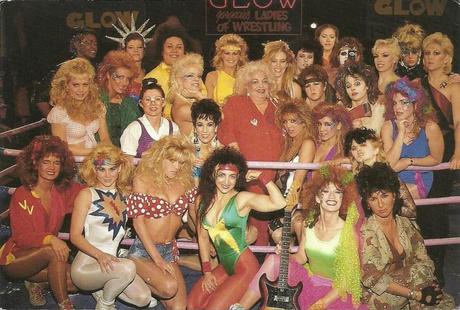
The real Gorgeous Ladies of Wrestling - the syndicated all-ladies wrestling TV show which offered counter-programming to Vince McMahon's surging WWE in the late 1980s - never made it out of Las Vegas. The promotion was first based out of The Riviera Hotel in Vegas and then in an old warehouse several miles from The Riviera. During that time, GLOW cranked out four seasons and over 100 episodes of TV wrestling, taping in front of Vegas tourists/locals, undergoing several management changes and creative retoolings along the way.
Production was already underway on a fifth season when the funding dried up, possibly because Pia Zadora pressured her casino owner husband to pull his money out of the promotion since she suspected he was sleeping with some of the wrestlers. That particular iteration of GLOW never recovered and quickly went away, scattering its roster of women to the wind. ( One became a porn star and then - many years later - a reality TV star. At least one eventually joined the WWE.)
In the decades since, there have been several attempted GLOW revivals, but the version of the show which everyone remembers wasn't actually around for that long and never found a permanent home outside of Vegas. This history has been the loose - and I mean loose - inspiration for what we've been watching and loving on Netflix for the past couple of years.
Fact #2: The Show Creators Began Their Careers as Playwrights
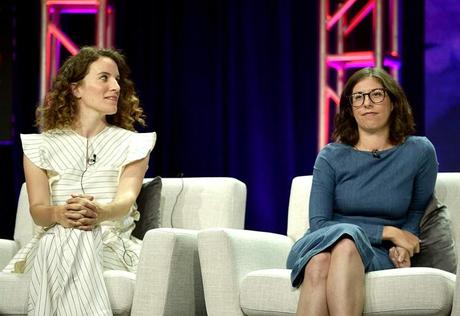
Prior to co-creating and co-showrunning GLOW for Netflix, Liz Flahive and Carly Mensch began their careers on the stage, or, to be more accurate, behind the stage. For years, they led seperate careers creating Off-Broadway plays, usually through the Ars Nova Theater. Flahive, a former beauty magazine editor, got her first play on stage by the time she turned 28. Mensch did so by the time she was 24, and her play Len, Asleep in Vinyl was even eventually adapted into the movie Len and Company.
It wasn't long before she jumped to TV and became a writer and co-producer on Weeds. She eventually moved on to writing for Nurse Jackie, rubbing elbows in the writers' room with - who else - Liz Flahive. They each spent the next half decade climbing the TV ranks before combining their efforts and finally breaking through with GLOW, a show initially sold as Jenji Kohan's Orange is the New Black successor but now more commonly understood to be Flahive and Mensch's baby.
Combine the Two
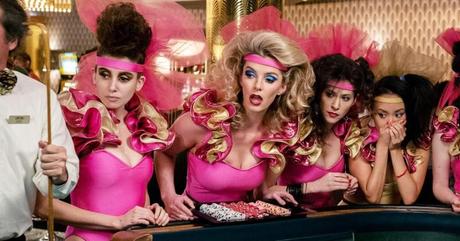
That's why the newly released third season of the show might be the most frustrating group of episodes the series has ever unleashed but also the most personal and important. As one recentheadline argued, " GLOW Season 3 is an argument for a Great Season 4."
It's a completely watchable, but also completely and unabashedly transitional third season. It nakedly calls on Flahive and Mensch's own experiences and likely creative frustrations with their old playwright days when they would put on the same show night after night. That's how the fictional girls of GLOW find themselves trapped in a practical time loop throughout season 3, stuck in a never-ending Vegas residency where they perform the same exact wrestling show - a condensed, best-of version of the TV show they'd been filming in the first two seasons - night after night to tipsyed tourists.
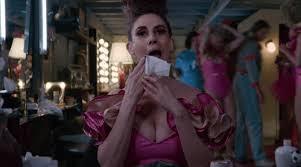
In the face of such creative stagnation, characters flail about in boredom, searching for answers or just pass-the-time fun in sex, gambling, and/or partying, but never working out, much to their trainer's eternal dismay. Long distance romances crumble. Most of the girls are bonded closer together. Others are driven away, possibly for good. Some new friends, like Geena Davis' frustrated casino manager and Bobby Barnes' scene-stealing drag queen, join the fun.
Existential Crises All Over the Place
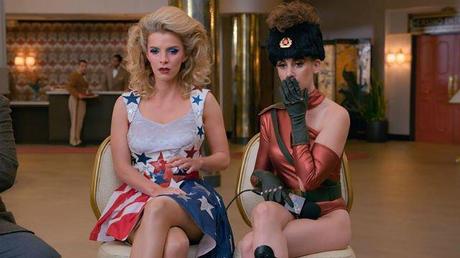
By the time the season ends, all of the major players have undergone their own existential crisis. Working and living in Vegas affords all of them with room and board, not to mention a livable wage, but also a lot of time to truly think about what they want to do with their lives and what kind of people they want to be. It's the kind of crisis brought on by a steady, but unsatisfying and unchallenging paycheck.
It's also GLOW, the Netflix show, beginning its full transition away from GLOW, the actual wrestling show. Spoiler, it appears as if this version of GLOW is ending its Vegas residency after just one season and venturing into new territory. The cliffhangery final scene sets us up for a season 4 in which Debbie's transition from actress to high-powered producer will take her and GLOW in a tantalizing new direction in LA while Ruth's refusal to give up on her dream of TV and film acting will likely lead her away from GLOW and into some very dark days. I can't wait to see all of that.
Lost in all of this naval gazing and remotivated eye toward the future, however, is the wrestling. To this point in GLOW 's history, the wrestling scenes have always been used for catharsis and metamorphic commentary. What was happening in the ring usually somehow mirrored - even if in a funhouse way - what was happening in the lives of the characters outside of the ring. Nowhere is this more apparent in season 2's standout episode contrasting the private and in-ring lives of the women the public knows as Welfare Queen and Liberty Belle.
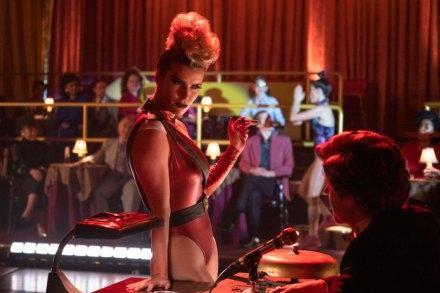
Season 3 seems only intermittently interested in that kind of storytelling. Heck, the season devotes as much time to the characters planning a late night AIDS fundraiser for their new friends as it does to the wrestling. When the characters manage to make their way back into the ring, the show makes the scenes count, giving us a memorable episode where the so-bored-it-hurts characters switch all of their in-ring characters just for fun and another where they somehow manage to make A Christmas Carol totally work in a wrestling context.
Many of the reviews thus far have called out this show about wrestling suddenly going so light on the wrestling. Which, fair. Whether dramatically compelling or not, GLOW's wrestling sequences have always been fun, and there isn't a lot of that this season. However, Betty Gilpin nailed it in a recent THR interview, explaining, "[Flahive and Mensch] have sort of screwed themselves by making the model be that there is no model. That they have to reinvent the wheel every season. So I hope they are hard at work reinventing the wheel. Because this is the greatest job ever and I want to do it again and again."
That's what GLOW is trying to do with season 3. The first two seasons were fundamentally about the characters trying to reach some new stage in their careers and personal lives, collectively willing GLOW forward against the bullshit prejudices of the day. Season 3 asks what happens when there's nowhere left to go. What happens when you plateau and the lure of convenience beckons you away from passion?
If that type of mid-career crisis doesn't interest you, GLOW still has what has always been its best weapon: the pleasure of getting to spend time with these characters. For this season at least, the characters have been freed from the machinations and process of producing and performing a weekly TV show with new storylines, which means we have even more time to sit with them for a spell and enjoy how they work together as a group. Debbie and Ruth, for example, get to be friends again in a way we haven't seen since probably the early scenes of the pilot.
Maybe this speaks to my own state of mind at the moment, but I actually found it riveting, watching these characters fall into comfortable friendships while confronting their respective crises. However, I can't argue the following: season 4 will probably be the far more traditionally entertaining season because there's so much more that's about to happen. Hopefully, Netflix agrees and doesn't add GLOW to its rapidly growing list of canceled comedies.
RANDOM PARTING THOUGHTS ON THE SEASON
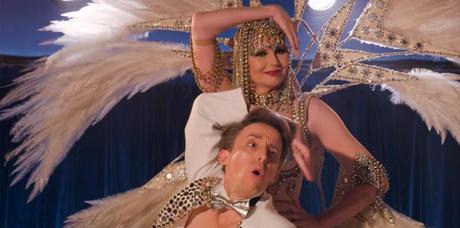
- Favorite line of the season: Debbie: "I wish more men would take a vocal rest."
- Favorite episode: "Freaky Tuesday"
- Favorite new character: Coming into the season, I would have expected to be saying "Geena Davis" here. Come on, GLOW is not too far from being A League of Their Own with wrestling instead of baseball, and they went and got an actual League of Their Own star to join the cast! While she is perfectly great in ever scene, she can't steal the spotlight from Bobby Barnes, the drag queen I never knew this show always needed.
- Breakout ensemble character: Sheila, who loses her She Wolf persona and somehow becomes fiercer - more fierce? - in the process.
- Ensemble characters I want to see more next season: Sam and his daughter. As storytelling choice to de-emphasize male-female romance and remind us that Ruth and Debbie are the true central couple of the show, Season 3 removes Sam and his will they won't they with Ruth from the show's equation fairly early in the season. He's sent off to L.A. to bond with his daughter. What that means, in effect, is far less of Marc Maron's grumpy old man act bouncing off the happier people around him, a dynamic I quite enjoy and missed a lot this season. It was hard for GLOW to account for the fact that for half the season Sam is essentially off screen in his own universe.
- With or without a ton of wrestling scenes, GLOW loves to double as a commentary on Hollywood gender roles, and as a sucker for stories about Hollywood I eat it all up with a spoon.
- Dear Netflix: You can take Santa Clarita Diet away from me. But, please, not GLOW. Season 4 is going to be so, so good! Don't cancel this wonderful show. (See this prior article for why I would even think they'd want to do that.)
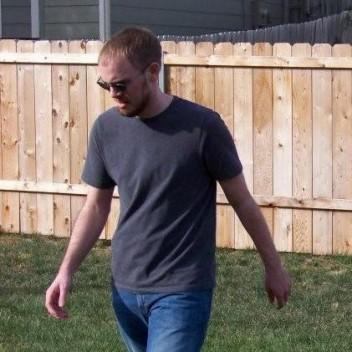
Grew up obsessing over movies and TV shows. Worked in a video store. Minored in film at college because my college didn't offer a film major. Worked in academia for a while. Have been freelance writing and running this blog since 2013. View all posts by Kelly Konda

